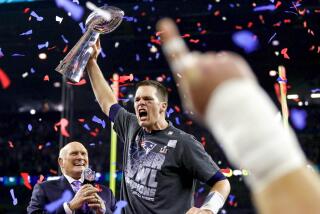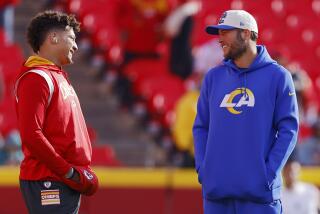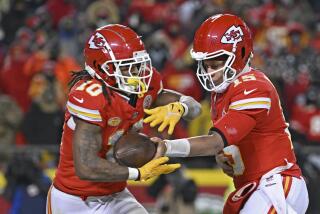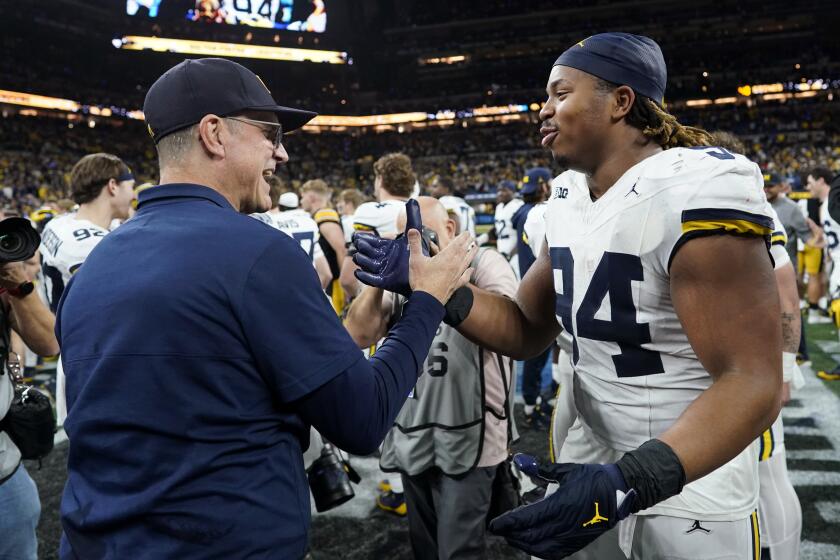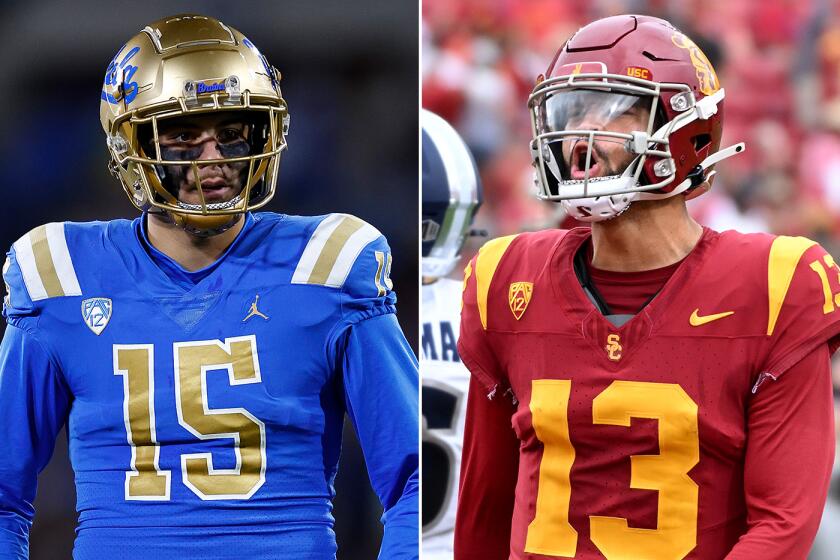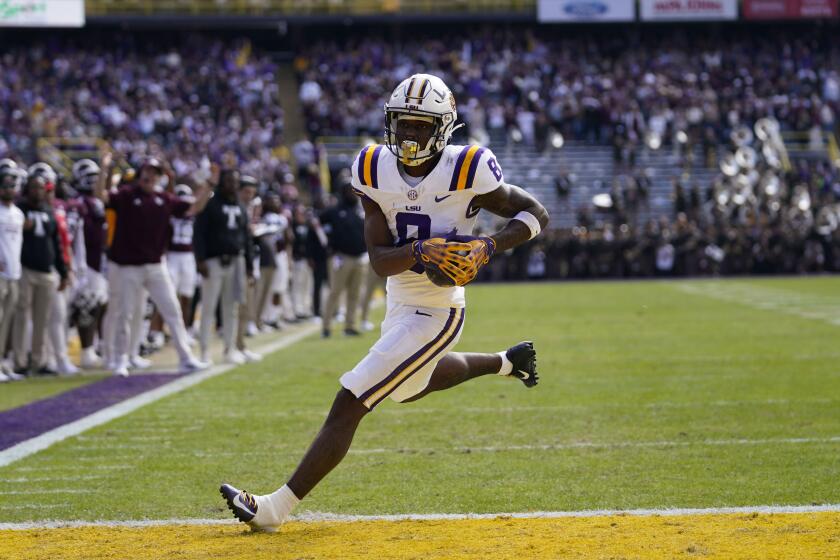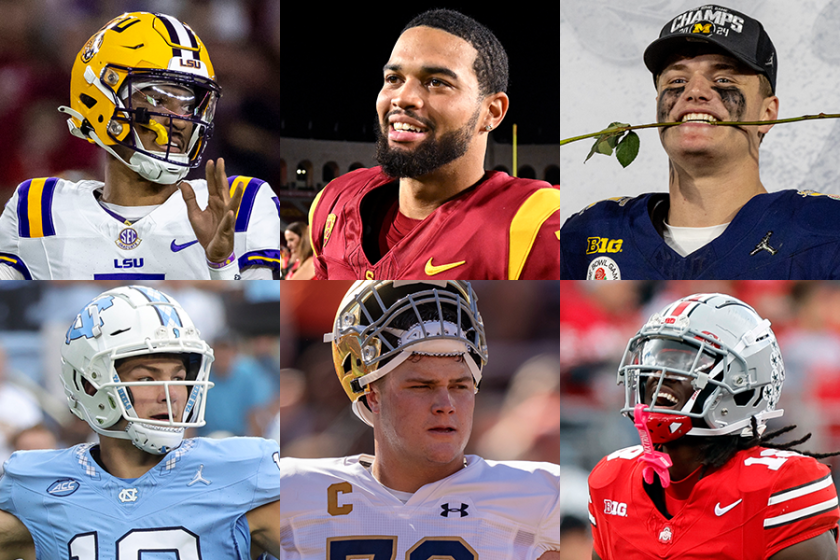Football, NFL style, making inroads in U.K.
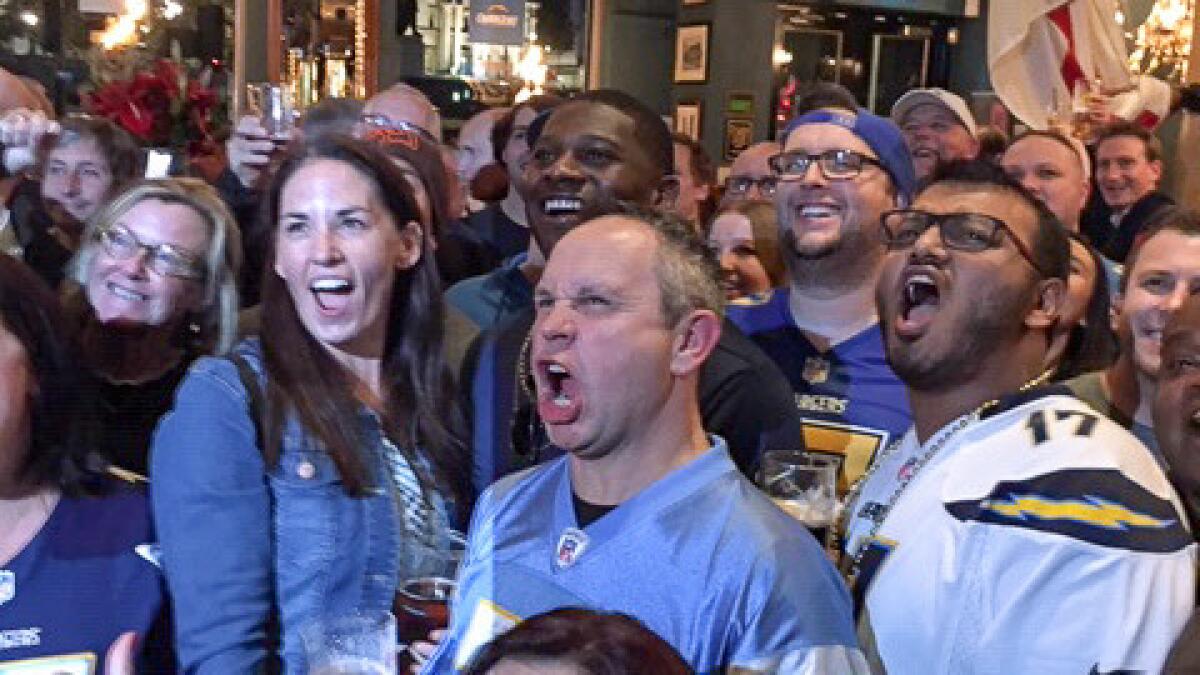
Osi Umenyiora’s return to London for the first NFL game there was a bit of a letdown, and not just because his heavily favored New York Giants, a team that won the Super Bowl that 2007 season, struggled to beat the winless Miami Dolphins, 13-10.
As cool as it was to see iconic Wembley Stadium packed with 81,176 fans, the slick low-cut grass of the soccer pitch had not been altered for football, “and we were slipping and sliding everywhere,” said Umenyiora, the former Giants defensive end who played 11 years in the NFL.
Giants quarterback Eli Manning had one of the worst games of his career, completing eight of 22 passes for 59 yards. Kickoffs, punts and field goals drew the loudest cheers in a country where soccer is king. Fans, unaware of the victory formation, booed when Manning took a knee for the game’s final three snaps.
“You had certain people who were very knowledgeable about the game, but I think at that particular time they were just there for the spectacle of it,” Umenyiora, 36, said. “They had heard about American football and were just there to see it in person.”
Umenyiora, who was born in London and moved to Nigeria with his family when he was 7, noticed a distinct difference when he returned to Wembley with the Atlanta Falcons to play the Detroit Lions in 2014.
The field, for one, was in much better shape after a more durable hybrid turf, a mixture of natural grass and artificial fibers, was installed in 2011.
There was a higher concentration of Falcons and Lions fans compared to 2007, when jerseys of virtually every NFL team were sprinkled throughout the crowd. Anticipation built as the Lions overcame a 21-0 halftime deficit and won, 22-21, on Matt Prater’s 48-yard field goal as time expired.
“They knew exactly what was going on, when to cheer, when to shout ‘Dee-fense!’ ” Umenyiora said. “The fans were rocking Detroit and Atlanta jerseys. They were a lot more knowledgeable. It was almost like being at a game in America.”
Umenyiora retired in 2014, returned to London in 2015, and is in his fourth season as an NFL commentator for BBC Sport. He expects an even better atmosphere Sunday when the Chargers play the Tennessee Titans in Wembley Stadium.
A dramatic increase in television coverage and digital and social-media engagement has boosted the NFL’s popularity in the United Kingdom, and fans have become increasingly sophisticated and discerning in their consumption of the sport.
Sky Sports, the U.K.’s largest pay-TV provider, is televising more than 100 live games a year, and weekly ratings for its broadcasts have doubled over the past decade, according to the NFL.
BBC TV provides live coverage for every London game and is in its third year of airing two NFL shows a week, featuring highlights, analysis and interviews.
Its half-hour show on Saturday night, which airs after the long-running Match of the Day English Premier League soccer highlights show, is among the network’s highest-rated shows for viewers in the 15-to-34 age group.
The NFL has a 10-year deal starting in 2019 to play two games a season in a new 62,000-seat stadium being built by the EPL’s Tottenham Hotspur.
The venue will be more intimate than Wembley, with improved sight lines bringing fans closer to the action. It will have two dedicated NFL locker rooms in addition to soccer locker rooms. An NFL turf field will be installed underneath the soccer pitch, which can be rolled in and out of the stadium.
All but three of the 22 games in London since 2007 have sold out, including last Sunday’s Seattle-Oakland game, which drew a Wembley-record crowd of 84,922.
The NFL estimates its U.K. fan base at 13 million, of which 4 million are “avid, dedicated fans who watch regularly, have a favorite team and a passion for the sport,” said Mark Waller, the NFL’s executive vice president of international. A record 47,000 season tickets were sold for three games in London this season.
“I think the fans over here either have a greater knowledge of the NFL than ever before, or they have a greater thirst for knowledge than ever before,” said Mark Chapman, presenter of the BBC’s NFL shows and as well as the Match of the Day 2 soccer show.
“Another interesting thing I’m noticing over the last couple of years on social media is plenty of disgruntled fans who haven’t gotten tickets to the games, which, in some ways, is a very good sign for the NFL. I haven’t seen that before.”
Chapman, 45, believes the NFL’s surge in popularity is being fueled by three demographic groups: those his age and older, who enjoyed watching football on U.K. network television in the 1980’s but stopped when games moved to pay-per-view; fans in their 20s and 30s who are discovering the sport for the first time, and youngsters such as his 15-year-old, fantasy football-playing son, Ben, who “are obsessed with it” for a variety of reasons.
“They love the physicality of it because in our football the physicality has been whittled away for 20 years,” said Chapman, who is based in Manchester, England. “They also like the parity of it, the fact that you’re not quite sure who’s going to win the Super Bowl, or who’s going to win from one week to the next.
“In our football here, you have the top six — Manchester City, Liverpool, Chelsea, Manchester United, Arsenal and Tottenham Hotspur — year in and year out, and everybody else is just fighting to stay in the top division.”
Robbie Kahar, 33, from London, and Dan King, 32, from Colchester, an hour north of the city, fit into Chapman’s middle demographic.
Both were at The Admiralty Pub in London’s Trafalgar Square — the NFL’s designated Chargers bar for the week — on Thursday night, rubbing elbows with Hall of Fame running back LaDainian Tomlinson and former Chargers linebacker Donnie Edwards, and throwing back a few pints with fellow Chargers fans. Both wore No. 17 Philip Rivers jerseys.
Kahar, a data analyst for a sports gambling company, started watching American football when he was in college in 2004 “basically because, with the time difference, it was on late at night, and being a uni student, we do a lot of drinking late at night,” he said. “I started watching and got more and more excited.”
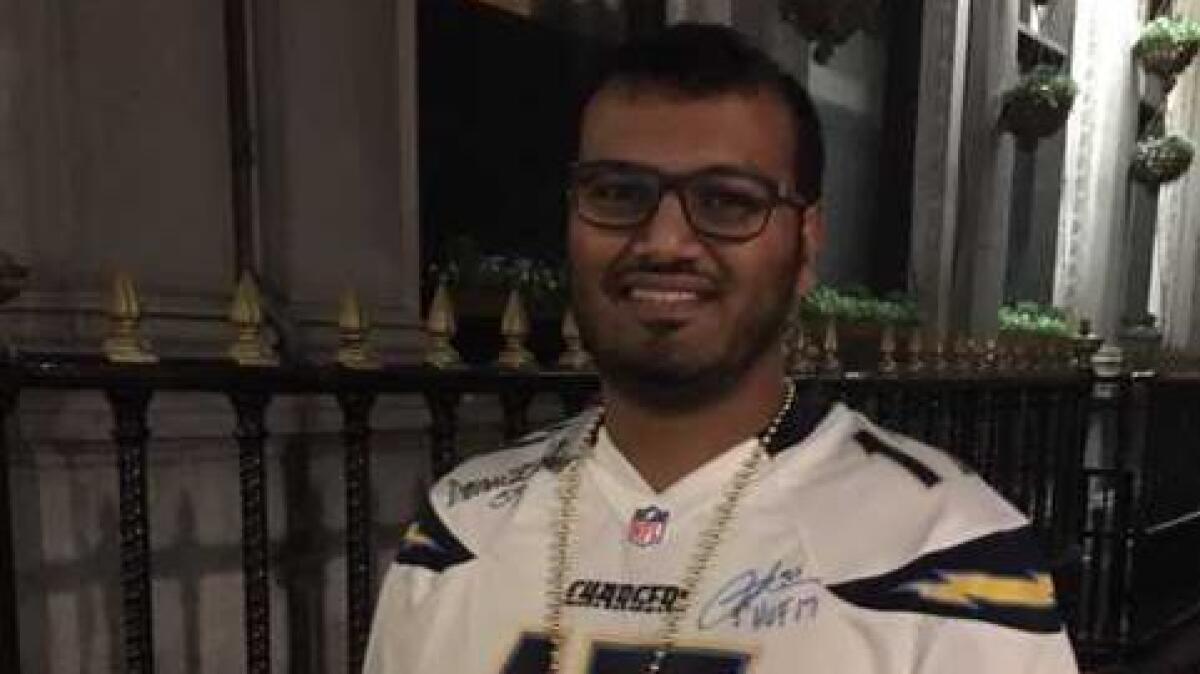
Kahar went to his first game in London in 2008, when the Chargers and Rivers lost a 37-32 shootout to New Orleans and Drew Brees.
“I had been watching football for a while and I said, ‘You know what? I need to choose a team,’ ” Kahar said. “So I said, no matter what happens, whoever loses this game, I’m going to back that team, because I love the underdog. The Chargers lost, and since then, I said, ‘Yep, that’s my team.’ ”
Cricket is still Kahar’s favorite sport — his family is from India — but the NFL is a close second. He watches every Chargers game on NFL Game Pass and keeps track of his fantasy football team on the RedZone channel.
Like Kahar, King, also a data analyst, fell in love with the NFL when he began watching games in college.
“It’s definitely growing,” King said. “When I started following it 10 years ago, I only had one friend who watched it. Now, I’ve got a circle of friends 20-30 strong that watch every week. It’s noticeable, the shift. My girlfriend started watching it as well, so now I get to watch football for six hours every Sunday.”
King attended his first game in 2008, when Tomlinson rushed 19 times for 105 yards and a touchdown and caught five passes for 65 yards and a touchdown.
“L.T. was the reason I got hooked on the game,” King said. “I was like, ‘I love this guy, I love this team,’ and it just stuck. It was surreal to meet L.T. tonight.”
King still loves soccer and roots hard for Colchester United, a fourth-division team in his hometown. But he felt naturally drawn to the NFL and has been playing fantasy football for seven years.
“I don’t have the biggest attention span, so everything being in short bursts really suited me to a T,” King said. “I can watch for 40 seconds, have 10 seconds of not paying attention, then 10 seconds of who’s lined up where, and it’s time to go.”
The NFL knows it will never replace soccer as the U.K.’s most popular sport, and football still lags behind rugby and cricket. But the NFL is jostling with golf, tennis, Formula One racing, boxing and mixed martial arts for a top-five spot.
“We’re definitely knocking on the door,” Waller said. “We now have a very legitimate place on the fall sporting calendar in a really competitive market.”
Chapman, in his 22nd year with BBC Sport, said he has noticed an increase in U.K.-based football podcasts and independent fan blogs in recent years and bigger crowds in sports bars showing the 6 p.m. Sunday games.—.1 p.m. on the East Coast. Coverage of the NFL has matured with the fans following it, growing more serious and critical in nature.
“With two highlight shows a week, live coverage of games, the fans are really into it,” said Umenyiora, who won a Royal Television Society Programme best presenter award for his NFL coverage in 2016. “You can’t just come out here and give them nonsense. They’ll call you out on it.”
The NFL is no longer a U.K. novelty act. The lighter fare that was a staple of early BBC coverage has been replaced by in-depth interviews with coaches and players, keen analysis and a focus on the issues of the day.
“You can’t get away with selling these games on BBC by giving me a television celebrity to talk to, or a Premier League footballer who always comes to the London games,” Chapman said.
“Whether it’s because of [HBO’s] “Hard Knocks” or [Amazon Prime’s] “All or Nothing” or they follow their team on social media, our audience knows these players and coaches. They’re invested in the sport, the rumors and the players, and we need to step up the intelligence here because people have the knowledge now.”
Chapman saw it as a sign of progress that the lead-up to last weekend’s Seahawks-Raiders game did not include the two eternal U.K. football questions: Will the league ever move a franchise or award an expansion team to London? What is the league’s long game here?
“I would hope we’re at a stage of actually just enjoying the London games for what they are rather than worrying about what might happen in the future,” Chapman said. “For me, the discussion of a London franchise feels a little passe, a little bit five years ago.
“At the moment, it feels like the balance is fantastic. We get three or four games a year, so you’re only four [home] games short of an actual London franchise. You get all these different teams, great players and great excitement. Maybe the future is actually the present, and there’s nothing wrong with that.”
There are significant hurdles to moving a team to London — attracting free agents to live overseas could be difficult, scheduling would be more complicated, and it’s an 11-hour flight from the West Coast.
“But the flight from the East Coast is five or six hours, the same as going from New York to Los Angeles, basically,” Umenyiora said. “If they found a way to actually put a human being on the moon, then they can logistically find a way to relocate a franchise here. It would be difficult, for sure, but it can be done.”
Follow Mike DiGiovanna on Twitter @MikeDiGiovanna
More to Read
Go beyond the scoreboard
Get the latest on L.A.'s teams in the daily Sports Report newsletter.
You may occasionally receive promotional content from the Los Angeles Times.

